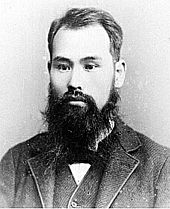Iwamoto Yoshiharu
Iwamoto Yoshiharu ( Japanese 巌 本 善 治 ; born July 30, 1863 in the province of Tajima (today: Hyōgo ), † October 6, 1942 ) was a Japanese journalist, literary critic and educator.
Life
Iwamoto Yoshiharu was born in the former Tajima Province , now part of Hyōgo Prefecture . His original family name was Inoue ( 井上 ). In 1876 he went to Tōkyō, where he attended the Dōjinsha school founded by Nakamura Masanao and the Gakunōsha school founded by Tsuda Sen and got to know the Protestant image of women in New England and was influenced by Christianity. In 1883 he was baptized. He became editor-in-chief of the Kirisutokyō Shimbun ( 基督教 新聞 , German "Christian newspaper") and subsequently founded the magazine Jogaku zasshi in 1885 . In 1887, after the founder Kimura Kumaji, he became the second director of the Meiji Jogakkō ("Meiji Girls' School") and endeavored, both in schools and through magazines, to educate women on the model of modernized American-style Christianity.
When Ōgai's story Maihime ( 舞 姫 , dt. “The Dancer”) appeared in 1890 , Iwamoto attacked her most violently and wrote: “About the act of impregnating a young girl without a proper marriage, I was so annoyed that it looked like me jumps. "When Tokutomi Sohō continued to publish the article Hiren'ai ( 非 恋愛 , dt." Non-love ") in the magazine Kokumin no tomo in 1891 and complained that the" zeal for love "was increasing between young people, Iwamoto published Hiren ' as a counter-reaction . ai o hitosu ( 非 恋愛 を 非 と す , dt. about: "deny non-love"). Iwamoto idealized a "healthy" form of love and relationship, but at that time Kitamura Tōkoku published fanatical essays on the subject of love such as his Ensei-shika to josei ( 厭世 詩 家 と 女性 , dt. "The pessimistic poet and women") or disappointed hopes descriptive treatises in the Jogaku zasshi , which led to differences between Iwamoto and Tōkoku. That was an occasion for Shimazaki Tōson and Kitamura Tōkoku to found the magazine Bungakukai .
Iwamoto Yoshiharu's wife was Wakamatsu Shizuko , actually Iwamoto Kashiko. She became known for her translation of the novel The Little Lord (under the Japanese title Shōkōshi ( 小 公子 ) in the same meaning), but passed away at a young age. The writer Nogami Yaeko , a student of Meiji-Jogakkō, wrote in her late work Mori ( 森 , dt. "Forest"): "There were rumors that suggested that Iwamoto had a relationship with a student after the loss of his wife."
Iwamoto revered Katsu Kaishū and published in 1899, the year of his death, Kaishū-yoha ( 海舟 余波 , "The aftermath of the Kaishū") and 1930 Kaishū-zadan ( 海舟 座談 , "Kaishū discussion round").
The violinist Iwamoto Mari is the daughter of Iwamoto Masahito ( 巌 本 荘 民 , Iwamoto Masahito ), the eldest son of Yoshiharu.
| personal data | |
|---|---|
| SURNAME | Iwamoto, Yoshiharu |
| ALTERNATIVE NAMES | 巌 本 善 治 (Japanese); Inoue, Yoshiharu (maiden name); 井上 善 治 (maiden name, Japanese) |
| BRIEF DESCRIPTION | Japanese journalist and literary critic |
| DATE OF BIRTH | July 30, 1863 |
| PLACE OF BIRTH | Tajima Province |
| DATE OF DEATH | October 6, 1942 |
